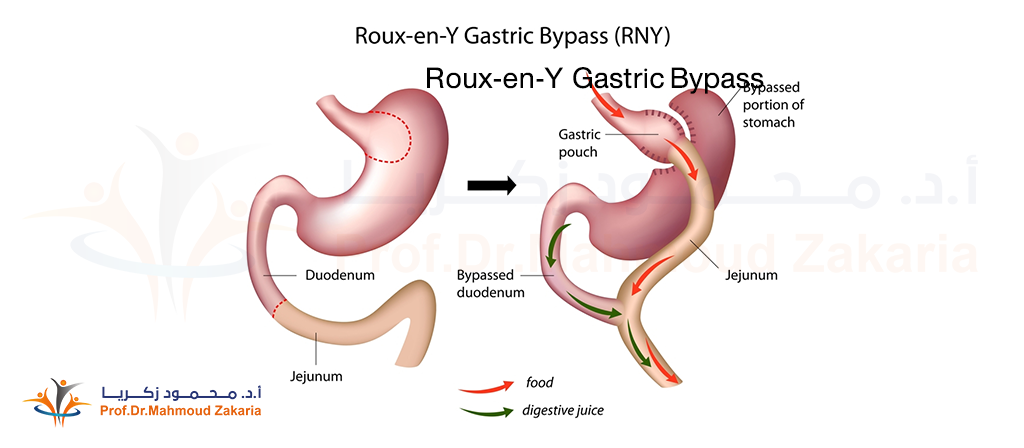R -Y Gastric Bypass
The classic laparoscopic gastric bypass surgery (Laparoscopic R-Y Gastric Bypass surgery) is one of the world’s first obesity surgeries with more than 600,000 procedures performed. It is the gold standard in obesity surgeries as it is very effective in losing weight without suffering from Gastroesophageal reflux disease (GERD) while eating also with a feeling of satiety. It has very high efficacy in obese patients who like sweets.
What are the steps of the R-Y gastric bypass?
The size of the stomach is reduced by making an upper gastric pouch, as big as a thumb, at the upper part of the stomach that performs the function of the stomach and is separated from the rest of the stomach using the latest staplers (the same ones that are used in the United States and Europe) with connecting the small intestine to the pouch and connecting the intestine to the intestine. After the operation, there is a feeling of fullness after just eating a small amount of food, thus limiting food intake, in addition to the fast arrival of food to the intestine, which leads to a decrease of absorption of some calories with an increase in the secretion of some hormones that aid in weight loss.
The operation is performed laparoscopically (we use the latest high-resolution laparoscopy in Egypt) and it can also be performed in the traditional open surgery (laparotomy), but this is not recommended. A leak test is performed at the end of the operation.

What are the advantages of Gastric Bypass Surgery?
- Rapid and sustained weight loss.
- The surgery has the longest clinical experience in the world.
- Minor surgical intervention (laparoscopic).
- Slightly higher total average weight loss was reported than purely restrictive procedures such as sleeve gastrectomy, long-term remission for high blood hypertension, type 2 diabetes, and metabolic syndrome.
Who is the ideal patient for the R-Y gastric bypass surgery?
The R-Y gastric bypass surgery is an appropriate procedure for obese patients with very high weights (BMI over 50), obese patients with diabetes, and high blood pressure, and obese patients who like sweets.
What are the benefits of using laparoscopy in R-Y gastric bypass operation?
- Pain relief after the operation
- Reduces the length of hospital stay
- No visible wounds early recovery and return to normal life and work compared to traditional open surgery.
- We do not recommend performing any obesity surgery by traditional open surgery. We always recommend using a laparoscope in obesity operations.
Is it dangerous to get pregnant later after gastric bypass surgery?
We recommend that pregnancy should occur at least one year after the operation so that the body can adapt to the reduction in stomach size o and the amount of food. Vitamins, iron, and calcium must be taken regularly after a gastric bypass operation, and pregnant women may need additional doses of iron and calcium in consultation with a nutritionist. If Pregnancy occurs under any circumstances during the first year after the operation, the pregnant woman must closely follow-up with a nutritionist to make sure that she consumes types of foods that are rich and beneficial to the fetus. Any medications or vitamins taken during pregnancy should be under the direct medical supervision of the gynecologist.
How does the patient get prepared for the operation?
- Before surgery, you should provide your doctor with a list of all medications, vitamins, minerals, and herbal or nutritional supplements that you are taking. After surgery, you may have restrictions on eating, drinking, and the medications you can take.
- If you take blood thinners such as Aspirin or Marivan, talk to your doctor before surgery. Since these medicines affect clotting and cause bleeding, you may need to change the routine or the dose of this medicine before the operation.
- If you have diabetes, talk to your doctor for specific instructions on taking or adjusting your medication before and after surgery.
- Smoking of all kinds must be stopped at least two weeks before the operation.
- If you have high blood pressure, your blood pressure must be completely controlled before the operation, by regularly taking your medications and measuring blood pressure daily a week before the operation.
How long does the recovery take after a gastric bypass operation?
- The operation takes about 60 minutes.
- The patient is discharged from the hospital 24 hours after the operation.
- All patients are encouraged to walk as early as 3-4 hours after the operation.
- Most patients return to work and/or school one to four weeks after the operation.
- Fatigue is common in the first two weeks due to the decrease in calorie intake in the liquid diet phase. However, the majority of patients do not feel hungry during this phase of the diet.
- The energy level improves rapidly after the introduction of the soft diet, which takes about two weeks after surgery.
- We sometimes allow patients to work from home 2-3 days a week after surgery.
- You can start walking from 30 to 60 minutes a day after pain relief. Patients can exercise two months after the operation.

